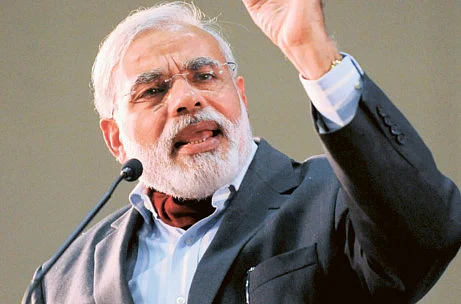Narendra Modi — the most talked-about politician in a country where talking is a national sport — is a polarising figure. Lauded and vilified in equal measure, he is an authoritarian thug to some and India’s saviour-in-waiting to others. To his supporters, he is a man of integrity who can get things done. To his detractors, he will forever be tainted by association with the 2002 massacre of Muslims in Gujarat, where, as the state’s Chief Minister, he was accused — though he was later formally cleared — of standing by while hundreds of revenge killings took place.
Manmohan Singh, the retiring (in both senses of the word) Prime Minister, summoned uncharacteristic venom when he pronounced that it would be “disastrous” if Modi replaced him after general elections due to be concluded in May. Pankaj Mishra, a novelist and essayist, said Modi was the “primary Indian exponent of capitalism with Chinese characteristics”. It was not meant as a compliment.
On the other side of the debate, Ratan Tata, one of India’s most respected businessmen, sees those “Chinese characteristics” — a willingness to take decisive action in the interests of economic growth — as one of his chief strengths. “One really has a sense of faith in Modi that if he says it will be done, it will be done,” Tata said.
Foreign investors, too, are near euphoric at the prospect of a leader with a reputation for bulldozing through bureaucracy. After years of drift under the Congress-led coalition, they are pining for a government that can make decisions and stick to them. Even after the gyrations in emerging markets set off by the free-falling Argentine peso, Indian stocks are only marginally off record highs. That in spite of the fact that the economy is growing at less than 5 per cent, half its peak of only a few years ago. A Modi victory, it seems, has already been priced in.
This raises two questions, neither straightforward. The first is: Will Modi really become prime minister? The second is, assuming he does, can he do for India what he has allegedly done for Gujarat? Or are investors getting ahead of themselves?
A Modi premiership is probably less of a certainty than many think, even if momentum is clearly on his side. Indian elections are notoriously hard to predict. Few guessed that the Hindu nationalist Bharatiya Janata party (BJP) — to which Modi belongs — would be knocked from power in 2004, when India was thought to be at its most shiny. Nor in 2009 did many expect Congress to win 206 seats in the 543-seat Lok Sabha, the lower house of parliament, returning it to a second term. Indian elections are often more local than national — this in a country where “local” can mean Uttar Pradesh, a state with more than 200 million people, or Bihar, whose Chief Minister, Nitish Kumar, is an erstwhile ally of the BJP who openly despises Modi.
This year’s election has been complicated further by a surge in support for the Aam Aadmi Party (AAP). Running on anti-corruption oxygen, Arvind Kejriwal, its activist leader, is now the Chief Minister of Delhi. Those who dislike Modi hope that the AAP, less than a year old and already suffering a backlash, can somehow rob the BJP of a hefty victory. If the BJP falls below 200 seats — and some polls show it squeaking past this number — it will need to scrabble together a broad-based coalition. The price for minority support could plausibly be an anybody-but-Modi demand. Nevertheless, Gujarat’s chief minister must have a better than 50-50 chance of assuming the top job.
What then? There are those who question whether Modi’s record has been quite as sterling as commonly portrayed, pointing out that other states, including Bihar, have made bigger gains. Even giving Modi the benefit of the doubt, it is not clear he will be able to do the same for India. Gujarat is a state of 60 million people; India a cobbled-together country of more than 1.2 billion.
Pratap Bhanu Mehta, president of New Delhi’s Centre for Policy Research, divides Modi’s tasks into two. The first is administrative. That means establishing a line of command and, crucially, driving through stalled infrastructure projects. In this, he thinks, Modi may make a difference. The second is more tricky. It involves setting stable policies and a workable macroeconomic framework, which the Congress administration has failed to do. Here, Modi’s intentions are more opaque. Nor is it clear how he would adjust to a more hawkish and independent-minded Reserve Bank of India (central bank) under Raghuram Rajan, its new governor.
Mehta says that, for better or for worse, Modi would be the first prime minister since independence in 1947 to achieve his position “solely on the basis of his own personality”. The son of a tea seller, he was born with a teaspoon in his mouth, not the silver spoon of the Nehru-Gandhi dynasty that has dominated Indian politics. His humble beginnings and outsider status would mark him out as a new kind of leader. They would not, of course, guarantee him success.
— Financial Times
Sign up for the Daily Briefing
Get the latest news and updates straight to your inbox
Network Links
GN StoreDownload our app
© Al Nisr Publishing LLC 2026. All rights reserved.
